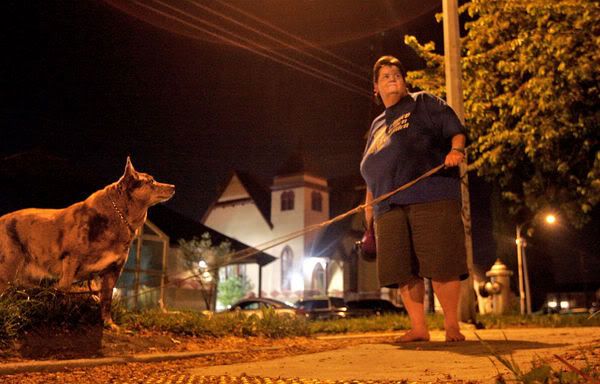Jeanie Peterson is tough. She's smart. She's committed to improving her Tacoma neighborhood. So what if she goes barefoot? "I'm not the kind of person who's afraid of things."
JASON HAGEY; jason.hagey@thenewstribune.com
Published: May 25th, 2008 01:00 AM | Updated: May 25th, 2008 06:44 AM
It's 2 a.m. on a Saturday, cloudy but dry. Forty-eight degrees. Perfect for a barefoot walk through the Hilltop.
Jeanie Peterson takes off down South Grant Street wearing a sweat shirt, shorts and no shoes. She's in search of knuckleheads.
• Related video: Meet Jeanie Peterson
Drug dealers. Gangbangers. Car prowlers. Drunken hooligans. Derelict landlords.
They're all "knuckleheads" to Peterson, a short, stout woman who learned how to fight as a young girl in Montana and has been honing the craft ever since.
Peterson, 54, is director of community initiatives for the Hilltop Action Coalition. Before that, she was the volunteer board president of the HAC, one of the oldest and most effective citizen groups in Tacoma.
The group is one of the reasons the Hilltop is no longer a war zone, according to police. In 1989, Tacoma made national news when a shootout erupted on South Ash Street between people at a crack house and a group of residents that included U.S. Army Rangers. No one was hit.
Today, neighbors and police agree the neighborhood's dramatically improved.
And Peterson is one of the reasons that the HAC has survived and
flourished.
She's an unusual citizen activist, not only because of her frequent lack of footwear and a flair for theatrics. She once lugged a garden cart full of empty liquor bottles into City Hall to make a point. But she also stands out because while other activists often work behind the scenes organizing citizens, Peterson is willing to be out front, walking the neighborhood and doing research on her computer into the wee hours of the morning.
NO SIGNS OF FEAR
Peterson walks quickly this morning, pulled along by her large dogs Took and Mia, scanning for anything that's out of place.
A broken traffic sign. A stream of water in the gutter – a sign of a broken water line at a vacant house. A car that looks abandoned.
She jots notes about these things in a pad she wears around her neck. She'll fire off e-mails to the proper officials when she gets home to her computer. She walks less often these days than she once did, maybe a couple of times a week.
It's a quiet morning. In an hour and a half of walking, Peterson encounters just three knuckleheads – a teenager shouting vulgarities up the street, and a pair of young men with no apparent destination. Drug dealers, she figures, waiting for a car to come along with a buyer.
"Evening," Peterson says as she passes them on the sidewalk.
One of the men mutters something about keeping her dogs away. There's a touch of fear in his voice.
"Pooches," Peterson calls to her dogs and tugs at the rope.
The men cross the street and keep walking.
Peterson stops and stares. There's nothing discreet about her surveillance, and she shows no sign of fear when the men reverse course and begin walking back toward her, passing her again but from the other side of the street.
Peterson waits a moment and begins following them, watching to see what happens.
Nothing. The streets are empty this morning except for Peterson, her dogs and the aimless knuckleheads.
The streets are quiet a lot more often now than when Peterson arrived in 1993.
In the '90s, drug dealers who figured out that Peterson was helping drive them out of the neighborhood retaliated by poisoning three of her cats, Peterson said. A man with a gun once parked in front of her house and yelled threats as she stood on her porch.
Peterson threw up her hands and yelled back, "I'm right here."
The guy probably wouldn't shoot, she figured, and if he did he'd probably miss. Knuckleheads don't know how to use handguns.
AN EARLY PROTESTER
Peterson spent her early years in rural Montana. Her older brothers baby-sat while her parents hung out in the bars.
She found refuge watching John Wayne movies on TV. John Wayne saved her life, she says. He gave her a moral compass.
Her family moved to Fife when she was in eighth grade. Her father came out for a job with a chain-link fence business.
In the late 1960s, Fife High School was one of the last public schools that required girls to wear dresses. Peterson helped put an end to that. She organized a protest where 60 girls showed up in pants one day. Soon after, the School Board changed the rules and allowed girls to wear slacks. Within six months, they were wearing blue jeans.
After high school, Peterson quit drugs – she once punched a principal during an acid flashback because he stepped on an imaginary rabbit – and became active in the Pentecostal church and the larger "Jesus people" movement.
"I replaced drugs with getting high on Jesus," she said.
She did some welding for her dad for a while before moving to Rapid City, S.D., where she worked as a water-meter reader.
From there, she moved to Des Moines, Iowa, to attend Open Bible College. She chose it because it was the only Bible school she could find that offered Hebrew and Greek classes to freshmen.
In 1974, Peterson was working security at an Iowa hockey arena. Part of the job was telling young men they couldn't take their beers into the seats.
After just one year at Bible college, Peterson moved to Moline, Ill., where she worked as a police dispatcher. It was her first taste of law enforcement, and might have been a good fit. Like John Wayne, she does not tolerate criminal behavior.
She was fired from the dispatcher job after telling off the sheriff's daughter.
No one would call Peterson a law-and-order conformist. She goes barefoot whenever possible in part because her feet get hot, but it's also an act of rebellion.
Peterson moved to Tacoma when her father became sick with cancer, and she later went to work at a U.S. Postal Service bulk-mail facility in Federal Way. She worked there 10 years before she hurt her back and retired on a medical disability.
That's when she found her true calling, the setting for her moral compass.
BREAD AND BIG DOGS
Peterson and her roommate moved from the East Side into the Hilltop in 1993, lured by the affordable real estate. She knew about the neighborhood's dangerous reputation, and they decided the only way they could live there was if Peterson did what she could to clean up the neighborhood.
She started as a block leader, baking "friendship" bread for her neighbors and teaching them how to use tools such as phone trees to make life uncomfortable for drug dealers. Walking the streets when most law-abiding folks are asleep was another way she could help.
She's hardly ever scared. She's always had big dogs, which helps. And Peterson and others say there's an unwritten code on the Hilltop in which even the knuckleheads pay a grudging respect to people such as Peterson who are from the neighborhood.
"I'm not the kind of person who's afraid of things," Peterson said.
Peterson's housemate, Andi DuMont, said she realized they became a target when they took on the bad elements, but she knew Peterson could handle herself. That knowledge gave DuMont confidence. Her attitude became, "If you mess with me, I mess with you," she said. "I know I've got backup."
After a couple of years, Peterson emerged as a leader within the Hilltop Action Coalition. She developed a reputation as a smart and hard worker, someone who was willing to put in the time researching issues instead of popping off to city officials about cleaning up the neighborhood.
People who work closely with Peterson say that's the reason why city officials take her seriously, even if she shows up at City Council meetings in a jester hat and no shoes.
"She is very, very smart," said Sally Perkins, a Hilltop resident who's known Peterson since Peterson first moved into the neighborhood. "Do not underestimate how hard she works. She's good at digging deeper."
When police couldn't get enough criminal evidence to shut down a drug house, Peterson and the neighborhood figured out they could use code violations.
A sewer line broke, giving officials an opening to inspect the house. They ended up finding $30,000 worth of repairs that needed doing, Peterson said. City officials made a deal with the woman who owned the house, allowing her a low-interest loan if she agreed to not allow her drug-dealing son back into the house.
The Hilltop Action Coalition was instrumental in the creation of the state's first Alcohol Impact Area, which bans stores from selling certain high-alcohol beverages. The group, and Peterson, are also credited with pushing Tacoma's crackdown on properties overrun with junk and weeds.
Peterson meets regularly with City Manager Eric Anderson. They co-chair a group of city officials and neighborhood residents called Tidal Wave of Change that looks for ways to improve the neighborhood. The group was instrumental in Tacoma's recent crackdown on nuisance yards.
"She knows how to help connect the community with the city staff," Anderson said.
Peterson also has the ear of Police Chief Don Ramsdell. She speaks to new police recruits, at the department's invitation, telling them what the Hilltop neighborhood expects of them – and how the neighborhood will help them do their job. She tells the new recruits to get to know the community liaison officers – who work closely with neighborhood groups – and to take advantage of the wealth of "intelligence" that block leaders can provide.
And she warns them to not blow off a call.
"If you just drive by, your sergeant is going to get a call," Peterson tells them.
'AN ODD DUCK'
It's that kind of accountability that helped turn around the Hilltop, said Greg Hopkins, a Tacoma police officer who's worked with Peterson for years.
"We didn't like it at first," Hopkins said of the nagging. "But I think it had to happen to get us where we are today."
Peterson has gained the trust of the Police Department because she spends time researching issues, and has proved trustworthy when police give her information, Hopkins said. It's not always apparent when police are working on a problem house, for example. Police feel they can tell Peterson what they're doing, he said.
"Even though she's an odd duck, people recognize her effectiveness," Hopkins said. "The cops love her."
David Alger, executive director of Associated Ministries, called Peterson his "most unusual" staff member. The Hilltop Action Coalition is a program of Associated Ministries, although it's in the process of establishing itself as its own nonprofit.
Peterson has earned the respect of city officials because she does her homework, Alger said.
"She's real," said the Rev. Gregory Christopher, senior pastor at Shiloh Baptist Church. "She's as real as they come. She has no underlying motivation other than to make the community better."
Peterson "advocates from a position of knowledge, not just opinion," Perkins said.
Sometimes that frustrates other neighborhood activists. A few years ago when some Hilltop residents wanted the Department of Corrections to stop releasing sex offenders into the neighborhood, Peterson took a different approach. She talked with DOC officials, studied sex offender recidivism, and visited the state's Twin Rivers Sex Offender Treatment Program at the Monroe Correctional Complex.
She learned that 93 percent of offenders who successfully complete the treatment program do not commit a new crime.
Now Peterson travels to Monroe whenever a Level 3 sex offender is about to be released into one of the Hilltop's two transitional houses, and she meets with the offender.
Peterson said she listens to offenders talk about their crimes, and their release plan. The treatment program teaches offenders to be forthcoming about what they did.
She's probably made 15 trips to Monroe, and only occasionally rejects an offender. In one case, it became clear that the man's friends were all gang members and that he initially lied about it, she said.
By working with the DOC, fewer offenders end up homeless on the Hilltop, and the state is more selective about who's placed in the two transitional houses.
"People say, 'Jeanie should say no to all of them,' but if I did we wouldn't be able to say no to the ones we really don't want," Peterson said.
Herman Diers, who worked with Peterson for years at the HAC, sees the benefit in Peterson's approach, even if doesn't match community sentiment.
"She was able to strike a terrific win-win situation by confronting the DOC with the unfair number of sex offenders relocated to the Hilltop," Diers said. "She has gotten the attention of the DOC."
Hopkins admitted that he was sometimes frustrated with Peterson's approach to the issue.
"But it's realistic," he said. "She knows the offenders are coming back."
In January, Peterson began receiving a salary for the first time for her work with the HAC. She had decided to see if there was a way she could get paid for some of the work she does for the neighborhood. Government officials had stopped her disability checks four years earlier after a psychiatrist concluded her back pain was really in her head.
AN ANNUAL RE-EXAMINATION
As the price of real estate on the Hilltop has soared, Peterson has seen some former block leaders move out because they could no longer afford the rent. It hasn't driven out homeowners yet, but she worried about some of the wealthier people moving into the neighborhood. They don't realize why it's important to be involved in the neighborhood, she said.
"We're sitting pretty cush and pretty now," Peterson said. But she sees graffiti and knows what it means. She still sees the Crips and the drug dealers in the neighborhood, even if they've taken their dealing underground or to other parts of town.
Without constant vigilance, Peterson fears the Hilltop could return to the days when there wasn't one working streetlight between Sixth Avenue and 25th Street because the drug dealers shot them all out, and when whole blocks were boarded up.
"We could be back to that in one summer," she said.
So she keeps walking barefoot in the middle of the night, and she keeps meeting with city officials to talk about things such as junk cars and derelict landlords.
It's her job now, but it's more than that.
It's something she's compelled to do.
"I believe that people should, once a year, justify their existence on this planet," Peterson said. "And on my birthday each year I have looked at my life the previous year with that type of scrutiny. If the day comes that I am not a positive addition to the planet, then I am just taking up air and should 'give up the mortal coil,' as they say."
Jason Hagey: 253-597-8542
blogs.thenewstribune.com/politics
JEANIE PETERSON
Age: 54
Occupation: Director of community initiatives for the Hilltop Action Coalition
Born: Rural Montana, near Missoula
High school: Fife
Moved to Hilltop: 1993
Housemates: Andi DuMont and Bruce Roberts. DuMont was making porcelain dolls and met Peterson, who was doing ceramics. They became friends and Peterson offered DuMont and her son a place to live when DuMont was divorcing. "She offered me a safe haven," DuMont said.
Nickname: Pooh. (A boyfriend told her she was like Winnie the Pooh because she was into eating and her friends.)
Estimated number of Pooh items in her bedroom: 600
Hobby: Surfing the Web for nature and wildlife photographs
Estimated number of animal photos on her computer: 200,000






No comments:
Post a Comment